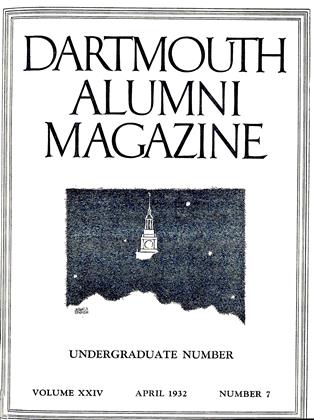Boynton Merrill '15. Pilgrim Press. 88 pp. $1.00. 1931.
We smiled tolerantly over the foibles and fevers of "Only Yesterday" when a clever writer reminds as of them. Probably a decade hence the historian will explain in lucid and masterly manner the moral and intellectual confusion under which, only dimly discerned, we suffer. It is one thing to be wise ten years after the event; quite another to raise a beacon light in the hour of darkness, to guide travelers through this mist of perplexity, bewilderment, pessimism and despair. The author of the present volume dares to attempt this difficult thing.
Boynton Merrill '15 has earned the right to speak in such matters. President of the Christian Association in college; three years in Union Theological Seminary and two more as Navy Chaplain; after a brief pastorate in Putnam, Conn., seven years as associate with George A. Gordon, Old South Church, Boston; now for four years pastor of the Second Church in West Newton, Mass.; an honorary degree of Doctor of Divinity from his Alma Mater; a growing reputation as preacher among schools and colleges; an authentic spokesman for the scientifically minded younger generation who believe that there is something in religion.
These eighty-eight pages contain five sermons prepared for and delivered to a well-to-do suburban congregation. There is no attempt to be comprehensive nor startlingly profound. But there is the throb of vital religion and the eager quest after spiritual reality; there is an active imagination, a skilful use of words, many a memorable phrase and sentence; there are insights that cut like razors and stick like burrs, thrilling calls to consecrated action; the style is vivid, the development of thought is logical and convincing, the purpose of the volume is clearly brought out.
The first two chapters describe the "day we live in" and discuss four major causes for the confusion of our times, while the closing sermon of the series summarizes and clinches the argument. The positive message is found in the body of the book. Guidance through the mists will come not by accepting any external authority, by wearing hand-me-down and thread-bare garments of religion, but only by developing certain innate spiritual capacities to the point where they strengthen the whole fabric of life and bestow inner certainty and joy. These inborn "powers" (only too rarely, alas, full grown) are: Conscience, the "inner sense of right and wrong, of high and low, of good and bad . . . obedience to the moral law"; Reason, "good intentions . . . bulwarked ... by intelligence, by that most uncommon thing, common sense"; and Faith, "conscience on a mountain top," "reason grown courageous." These are the dynamics of the good life, presented with winsome beauty and compelling vigor; "by these things men live and by these things they are made strong."
Vital, sincere, intelligent, practical religion! Out of mature experience "Dick" Merrill speaks directly and convincingly to those who sense their wistful bewilderment. The book is not a call to the hermit life of the religious recluse, but to the arduous life of the builder of a fairer world in the spirit and under the guidance of the Master Builder. "Religion is not only something to be thought about, it is something to be done. It is a program of life; it is a method of living. It is a plan of campaign and a song to march by. Put God, your fellows, your world, yourself, to the test. ..."
 View Full Issue
View Full Issue
More From This Issue
-
 Article
ArticleAn Undergraduate Looks at His College
April 1932 By Howland H. Sargeant '32 -
 Article
Article"Wildcatter"—A Play in One Act
April 1932 By James W. Riley '32 -
 Class Notes
Class NotesCLASS OF 1910
April 1932 By Harold P. Hinman -
 Class Notes
Class NotesCLASS OF 1928
April 1932 By Leroy C. Milliken -
 Class Notes
Class NotesCLASS OF 1926
April 1932 By J. Branton Wallace -
 Article
ArticleThe Value of Fraternities to the College
April 1932 By Robert Coltman '32
Books
-
 Books
BooksTHE HAND IN THE PICTURE,
November 1947 By Eric P., THEODORE KARWOSKI -
 Books
BooksPREMIER MANUEL. GRAMMAIRE ET CIVILISATION FRANCAISES.
November 1954 By FRANCOIS DENOEU -
 Books
BooksDON'T COME CRYING TO ME.
February 1955 By HERBERT F. WEST '22 -
 Books
BooksYOUR JOB: TO HAVE AND TO HOLD.
NOVEMBER 1971 By JOHN HURD '21 -
 Books
BooksTHE ENJOYMENT OF MANAGEMENT.
MAY 1972 By JOHN HURD '21 -
 Books
BooksA MODERN CONQUISTADOR. ROBERT BONTINE CUNNIN GHAME GRAHAM
February 1933 By John Hurd Jr


